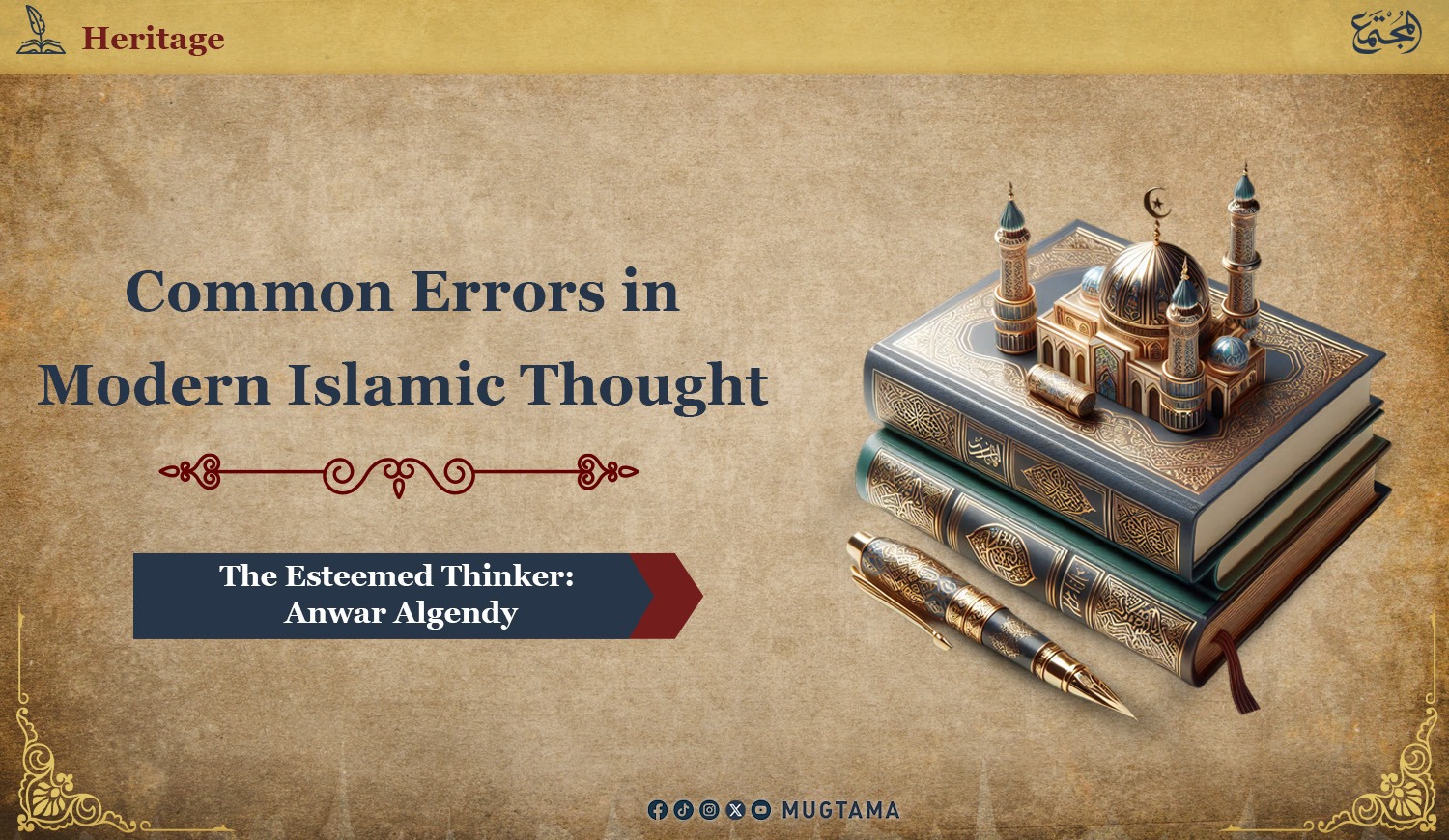Common Errors in Modern Islamic Thought

There is no doubt that "calling for the correction of concepts" is a work of great importance in this stage of our nation’s life, our Islamic thought, and our Arab culture. It requires us to take a broad look at the many errors that have become prevalent in the modern era through numerous studies, books, textbooks, and various educational curricula. These concepts were imposed, supported, deepened, and polished by foreign and intellectual colonialism, which gave them the appearance of fundamental, unquestionable truths. However, they are false and have no scientific basis or historical support to guarantee their credibility.
Here are some of the ‘Historical Errors Presented as Facts’:
1. 1- Colonial Campaigns Portrayed as Geographical Discoveries
In many school textbooks, the colonial campaigns in Africa and
Asia are described as the forerunners of geographical discoveries. These books
state: "In the final years of the fifteenth century and the beginning of
the sixteenth century, Europe witnessed a movement of vast geographical
discoveries, and the Europeans reached India by circumnavigating southern
Africa."
In reality, these were not geographical discoveries but
colonial conquests, far from the spirit of science and the methods of
exploration. The initial stages of this colonialism carried within them a
dangerous, fundamental concept: the encirclement of the Islamic world from
behind.
The Portuguese did not discover India or Africa. India had
been known in Europe since ancient times. Prince Henry the Navigator, Vasco da
Gama, and Afonso de Albuquerque were not scientific explorers as much as they
were ambitious conquerors driven by a spirit of hatred and fanaticism against
Muslims.
Their actions and behavior in various Islamic lands and Arab
ports they landed in demonstrated an extreme level of violence. These campaigns
were launched from Al-Andalus (Spain and Portugal) after it was freed from
Islamic and Arab influence, as a reaction and a desire for revenge and
conquest.
Therefore, it is a mistake for our schoolbooks and various
historical texts to portray Henry the Navigator as a scientist and discoverer
or Vasco da Gama as a sincere traveler for the sake of knowledge. Instead, they
should portray him as he was in his violent voyages. For example, on his second
voyage to Asia before reaching the shores of India, he used his heavy cannons
on Islamic ships carrying pilgrims from Mecca, burning and sinking them after
transferring the pilgrims’ money and belongings to his fleet. He then forbade
his men from rescuing any of the drowning, including women and children, until
they all perished.
Everything that Arab books report about Europe's
"discovery" of Africa is a pure error. The crossing of the Indian
Ocean from the coasts of East Africa to Asia had been known to Arab and Indian
sailors for centuries.
The same applies to the description of Samuel Baker's journey
to the sources of the Nile, his discovery of Lake Albert, and the claim that he
reached lands untouched by human feet. Many Arab historians and travelers
preceded Samuel Baker to these regions. They described the Nile tribes, tribe
by tribe, and explained their customs and morals, comparing their histories and
languages.
In truth, "exploration" was merely the vanguard of
colonialism. It had no scientific character but was based on violence and
fanaticism. It was not a venture into untouched land but was preceded by many
Muslim and Arab travelers.
2. The Claim That the Arab World's Renaissance Originated with Napoleon's Campaign
This claim, that Arabs and Muslims did not awaken from their
slumber until the West awakened them, has no historical or scientific basis.
The Islamic world and the Arab nation had awakened long before the French
campaign. This awakening began in the mid-18th century, or more specifically
around 1750, when Imam Muhammad ibn Abd al-Wahhab's call for monotheism echoed
from the heart of the Arabian Peninsula, and its repercussions spread
throughout the entire Islamic world.
This precedes the arrival of the French campaign by more than
half a century and the arrival of missionary groups by at least 100 years.
Before the French campaign, the movement of scholars at Al-Azhar had already
drafted the first document on human rights when they took a written pledge from
the Mamluk princes not to oppress their subjects or impose any taxes or
restrictions on them.
3. What Is Described as the Turkish Occupation
Many historians and researchers describe the relationship that
existed between Arabs and Turks within the Ottoman Empire as a "Turkish occupation" or "Turkish colonialism," while in reality, it
was not. The most accurate description is an integration between Arabs and
Ottomans into a comprehensive Islamic unity after Arab forces weakened and the
Mamluks and Seljuks grew stronger. At this time, the European threat re-emerged
and attempted to resume the Crusades.
It is well-known that the Arabs welcomed the Ottoman Islamic
unity after the Mamluk forces in Egypt and the Berbers in Morocco weakened and
became targets of new Crusader campaigns. They found in the Ottomans a new
resurgence for Islam and a young, nomadic, fighting force that raised the
banner of Islam high and brought back the memory of the early heroes who worked
to honor and spread Islam.
Arabs in Egypt and the Levant also welcomed the Ottoman
Islamic unity after they had become resentful of the Mamluk state for
neglecting their affairs in the final stage, so they fought in the Ottoman
ranks. The fact is, there was no fundamental conflict between the Arabs and the
Turks at this stage. The Islamic character was the essential unifying factor
between the different elements and units organized under the banner of the
greater Islamic unity. It is fair to say that in the initial phase, the Ottomans
represented the concept of Islam in their governance and acted within its
framework.
Historians note that the Ottomans followed in the footsteps of
the Caliphs in justice and tolerance, emulating their actions and taking them
as role models. They worked to win hearts by appreciating scholars and the
pious and by establishing mosques and schools.
Therefore, the claim that the relationship between Arabs and
Turks was colonial is a false term imposed by intellectual invasion and
Westernization. As for the conflict between the Turks and Arabs after the
removal of Sultan Abdul Hamid and under the rule of the Committee of Union and
Progress, that is another matter with its own factors and consequences,
requiring a special study.
4. The Middle Ages
The phrase "Middle Ages" is often used to describe
the bright Islamic era as if it were part of the "dark" Middle Ages.
Historically, the Middle Ages is the period between the fall of Rome in the
fourth century CE and the European Renaissance in the fifteenth century. This
period is referred to by Europeans as the "Dark Middle Ages," as Europe experienced one of its worst phases of
weakness and backwardness. However, this same period, from the sixth century CE
onward in the Islamic world, was the dawn of Islam and the expansion of the
Islamic civilization and state, which reached the borders of China in the east
and France in the west. Throughout this long phase, Islam played a huge role in
enlightenment and justice that encompassed this vast region of the world and
even reached Europe itself.
This period was one of light, strength, and civilization for
the East and the Islamic world. Therefore, using the term "Middle
Ages" for it is a unjust label. The Dark Middle Ages were dark only for
the West, but they were bright and radiant for India, Persia, the Arabs, Egypt,
the entire Maghreb, and Al-Andalus as well.
5. "Clergy Men "
This is a Western, imported term that writers and thinkers try
to apply to scholars specializing in the study of creeds, jurisprudence,
Sharia, and Quranic exegesis. These scholars' studies are mostly derived from
purely Islamic institutions like Al-Azhar,
Al-Zaytuna,
and Al-Qarawiyyin.
In reality, Islam does not recognize a specific class called "men of
religion" with a special system, specific rights, or any kind of
influence. Instead, there are scholars who specialize in Islamic and religious
studies.
6. The Products of a Period of Weakness and Decline
The period of weakness in the Islamic world preceded the
modern awakening. The works and effects from this period, which were dominated
by rigidity and imitation, can in no way represent the essence of Islamic
thought or be used as a basis to accuse Islam and its thought of being
deficient and backward. This is especially true regarding the determinism that
dominated Sufi concepts or the introduction of elements from ancient Indian,
Persian, and Zoroastrian philosophies that held concepts incompatible with the
essence of monotheism, such as pantheism, incarnation, and unification.
Islamic thought should be judged by its first principles and
by the works of its pioneering figures, not by the products of a period of
weakness and rigidity. The authentic essence of Islamic thought remains
illuminating, positive, influential, and a source of progress, construction,
and vitality for different nations and various eras.
7. The Lie That Islam Is the Source of Arab and Muslim Backwardness
This is a claim repeated by colonial powers and their followers who advocate for Westernization and Arab chauvinism, and it finds receptive ears. However, when it is examined through a scientific and historical approach, its falsehood becomes clear beyond any doubt. The backwardness of Arabs and Muslims is indeed primarily due to a deviation from the core concepts of Islam. If the Islamic world had remained connected to the essential principles and values of Islam and had not deviated from them, it would not have fallen into this crisis.The reality is that this backwardness of Muslims from the
principles of their thought—which are strength, awakening, and unity—is what
enabled the West to occupy them. During this period, they were not representing
Islam, and Islam was obscured by their actions. The claim that the backwardness
of Muslims is due to Islam is refuted by historical experience. Islam
established a vast civilization under its creed and concepts and was able to
offer humanity a unique model of the meeting of science with the spirit of
religion. It also gifted humanity the experimental scientific method upon which
modern civilization was built.
In conclusion, the major issue among the common errors is the
very concept of "Islamic thought," its principles and foundations,
and the doubts and confusion that have been directed at it.
-------------
Written by: The Esteemed Thinker: Anwar Algendy
You may also like:











